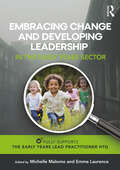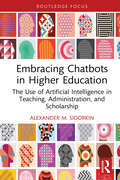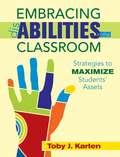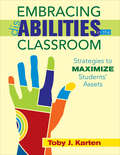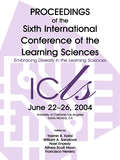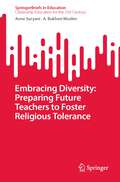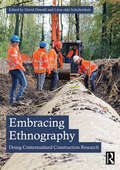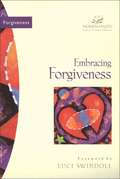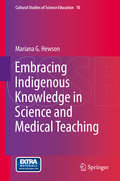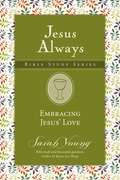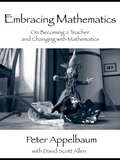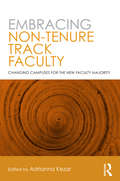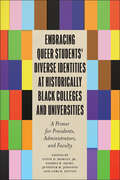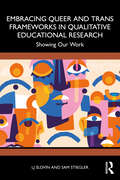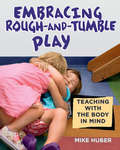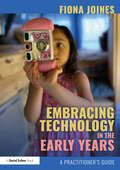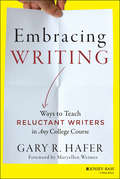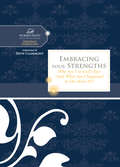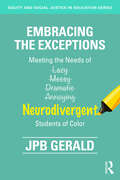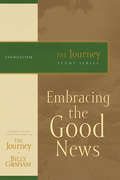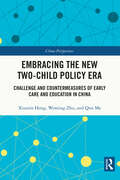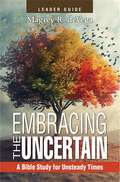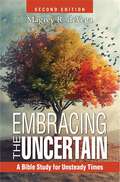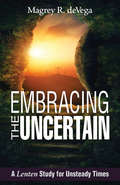- Table View
- List View
Embracing Change and Developing Leadership in the Early Years Sector (Early Years)
by Michelle Malomo Emma LaurenceThis book champions the unique knowledge, skills and behaviours of early years (EY) practitioners, and shows how they can exercise individuality in response to the diverse needs of children and their families.Fully mapped to the requirements of the new Early Years Lead Practitioner HTQ, this practical guide offers a reflective and challenging stance to critically evaluate the intentions that underpin EY policy and practice, and considers how to reimagine practice in challenging times to remain aligned with child-centred values. Structured to inspire, chapters delve into six key themes: the educator and developer of children, the custodian, the planner, the advocate, the collaborator and the innovator. It includes critical questions, reflective exercises and case studies, enabling readers to directly apply their knowledge to practice and use this text as a comprehensive, one-stop guide.Embracing Change and Developing Leadership in the Early Years Sector is a contemporary guide for early years practitioners and students. It is an essential resource for the new Early Years Lead Practitioner HTQ qualification.
Embracing Chatbots in Higher Education: The Use of Artificial Intelligence in Teaching, Administration, and Scholarship (Routledge Research in Digital Education and Educational Technology)
by Alexander M. SidorkinThis book explores the integration of AI-powered chatbots such as ChatGPT into higher education for instructional and communication purposes. The author emphasizes the responsibility of higher education institutions to equip students with advanced skills for writing with AI assistance, and prepare them for an increasingly AI-driven world.Offering numerous practical tips, the book demonstrates how universities can increase student success, and stem the rising cost of higher education by employing AI tools. The chapters discuss streamlining tasks such as grading, providing feedback, and handling administrative duties, to show how educators can be enabled to focus on more meaningful aspects of their work. The author also reflects on the philosophical and ethical considerations and potential pitfalls of relying on AI in higher education, including concerns about academic integrity and the importance of human input in the learning process. The author offers a responsible and informed approach to incorporating the new powerful tools into the academic landscape.This volume will be a key resource for higher education faculty and administrators seeking to navigate the complex intersection of AI and writing.
Embracing Disabilities in the Classroom: Strategies to Maximize Students? Assets
by Toby KartenHow we treat others often influences how individuals feel about themselves. This book illustrates how educators can effectively promote sensitive, inclusive classroom practices that maximize success for students with disabilities. Embracing Disabilities in the Classroom provides content-rich interdisciplinary lessons accompanied by behavioral, academic, and social interventions that capitalize on student strengths. Inclusion expert Toby J. Karten demonstrates the impact of literature, self-advocacy, role playing, and strategic interventions on students' growth and achievement. The numerous lessons, tables, rubrics, instructional guidelines, and charts help readers: * Determine effective strategies for differentiating instruction for specific disabilities * Modify lessons and curriculum appropriately in the content areas * Encourage students to become active participants in learning * Increase disability awareness and foster inclusive mind-sets in students, colleagues, and families This practical resource provides special education and general education teachers, principals, and teacher leaders with both effective instructional strategies for curriculum delivery and responsive approaches to promoting positive attitudes toward disabilities. Given appropriate support and an accepting environment, all students are able to achieve, thrive, and succeed in school and in life!
Embracing Disabilities in the Classroom: Strategies to Maximize Students’ Assets
by Toby J. KartenFoster positive experiences by differentiating not only instruction but attitudes too! This practical resource illustrates how educators can effectively promote sensitive, inclusive practices that maximize success for students with disabilities. Karten demonstrates the impact of literature, self-advocacy, role playing, and behavioral, academic, and social interventions on students’ growth. The numerous tables, rubrics, instructional guidelines, charts, and content-rich interdisciplinary lessons help readers: - Determine effective strategies for differentiating instruction for specific disabilities - Modify lessons and curriculum appropriately in the content areas - Encourage students to become active participants in learning - Increase disability awareness and foster inclusive mind-sets in students, colleagues, and families
Embracing Diversity in the Learning Sciences: Proceedings of the Sixth International Conference of the Learning Sciences
by Yasmin B. Kafai Francisco Herrera William A. Sandoval Noel Enyedy Althea Scott NixonMore than a decade has passed since the First International Conference of the Learning Sciences (ICLS) was held at Northwestern University in 1991. The conference has now become an established place for researchers to gather. The 2004 meeting is the first under the official sponsorship of the International Society of the Learning Sciences (ISLS). The theme of this conference is "Embracing Diversity in the Learning Sciences." As a field, the learning sciences have always drawn from a diverse set of disciplines to study learning in an array of settings. Psychology, cognitive science, anthropology, and artificial intelligence have all contributed to the development of methodologies to study learning in schools, museums, and organizations. As the field grows, however, it increasingly recognizes the challenges to studying and changing learning environments across levels in complex social systems. This demands attention to new kinds of diversity in who, what, and how we study; and to the issues raised to develop coherent accounts of how learning occurs. Ranging from schools to families, and across all levels of formal schooling from pre-school through higher education, this ideology can be supported in a multitude of social contexts. The papers in these conference proceedings respond to the call.
Embracing Diversity: Preparing Future Teachers to Foster Religious Tolerance (SpringerBriefs in Education)
by Anne Suryani A. Bukhori MuslimThis book presents a detailed discussion of Indonesian future teachers’ experience of religious diversity, tolerance and intolerance, their level of intellectual humility, and intentions to foster religious tolerance. Drawing from large-scale mixed methods research conducted in Indonesian universities involving over one thousand three hundred future teachers from diverse religious backgrounds, this book demonstrates that religion and religious beliefs can, and do, shape the way future teachers view their teaching practices and pedagogies. The book sheds light into the under-researched yet prominent issue of integrating tolerance into teacher education preparation. It is set in the largest Muslim-majority country in the world which, in recent years, has seen a gradual degradation of secularity while religion becomes more dominant across all levels and sectors of society. This novel and timely book is of interest to researchers, scholars, and students in religious studies, education, social sciences, and Asian studies, as well as anyone interested in the interplay between religion and education in the 21st century.
Embracing Ethnography: Doing Contextualised Construction Research
by David Oswald Léon Olde ScholtenhuisThis book calls for those interested in robust construction research to embrace ethnography – in all its forms, including rapid ethnographies, ethnographic-action research, autoethnography, as well as longer-term ethnographies.The diversification of ethnographic approaches, as well as ethnographers, will lead to rich insights that can advance the industry theoretically and practically. We share experiences, key considerations and recommendations from leading construction ethnographic researchers from around the world to provide discussion, reflection and understanding into doing ethnography in the construction industry.This book is aimed at academics, students, consultants, editors, reviewers, policymakers, funders and others interested in robust research in the construction industry and built environment but will also be useful for those undertaking research within organisations in other industries.
Embracing Forgiveness
by Luci Swindoll Various AuthorsThe Women of Faith Bible Study Series helps you turn the laughter and lessons of Women of Faith conferences into a journey of growth shared by special friends. Whether or not you've attended a conference, you will appreciate the bonds that form as you join with other women linked together in friendship, prayer, joy, and faith. Each study will also lead you to a deeper love of the Bible and a greater appreciation of the power of God's Word. Each session included six sections: - A Moment for Quiet Reflection - Just for Fun - Knowing God's Heart - Praying Together - Friendship Boosters - Making it Real in Your Own Life - The leader's guide that's included makes it easy to facilitate weekly Bible studies that will nurture your knowledge of Scripture and your sense of God's presence in your life.
Embracing Indigenous Knowledge in Science and Medical Teaching
by Mariana G. HewsonThe focus of the book is on different ways of knowing: the western scientific way (reductionist, dualistic and materialist) versus the indigenous approach (holistic, non-dualistic, and spiritual). It discusses both science and medicine in the context of the challenges experienced in introducing science and medicine into Africa through imperialism, colonization, and globalization. It looks at selected indigenous African paradigms, the dominant western paradigms, and the practitioners that represent these practices. The book deals with questions concerning compatibility and incompatibility of different ways of knowing and delves into epistemological stances, and the assumptions underlying these epistemologies. The volume investigates whether, and how a person can accommodate different epistemologies, and the nature of such accommodations.
Embracing Jesus' Love (Jesus Always Bible Studies)
by Sarah YoungAfter many years of writing her own words in her prayer journal, missionary Sarah Young decided to be more attentive to the Savior's voice and begin listening for what He was saying. So, with pen in hand, she embarked on a journey that forever changed her—and many others around the world. In Jesus Always, Sarah recounts the words and Scriptures that Jesus has laid on her heart to help her growth in faith and lead a joy-filled existence. She relates how leading a quiet life since writing Jesus Calling has helped her find little treasures that brighten her day—treasures she now shares with readers in the pages of her book.In Embracing Jesus' Love, participants will be guided through eight sessions of study that explore what the Bible has to say about the way God views them as a precious treasure, how He restores them gives them a new identity, and how they should in turn respond to God's generous offer of grace and love. They will discover, as Paul wrote, "[God] saved us, not because of righteous things we had done, but because of his mercy… so that, having been justified by his grace, we might become heirs having the hope of eternal life" (Titus 3:5,7).Each eight-session study includes readings from Jesus Always, selected Scripture and study questions, and daily reflection questions, and is designed for use in personal, small group, or classroom settings.
Embracing Mathematics: On Becoming a Teacher and Changing with Mathematics
by Peter Appelbaum with David AllenThis alternative textbook for courses on teaching mathematics asks teachers and prospective teachers to reflect on their relationships with mathematics and how these relationships influence their teaching and the experiences of their students. Applicable to all levels of schooling, the book covers basic topics such as planning and assessment, classroom management, and organization of classroom experiences; it also introduces some novel approaches to teaching mathematics, such as psychoanalytic perspectives and post-modern conceptions of curriculum. Traditional methods-of-teaching issues are recast in a new discourse, provoking new ideas for making mathematics education meaningful to teachers as well as their students. Co-authored by a professor and coordinator of mathematics education programs, with illustrative contributions from practicing elementary, middle, and high school mathematics teachers, this book is a unique collaboration across all pre-college grades, making it ideal for teacher discussion groups at any level. Embracing Mathematics: integrates pedagogy and content exploration in ways that are unique in mathematics education features textboxes with reflection questions and suggested explorations that can be easily utilized as homework for a course or as discussion opportunities for teacher reading groups offers examples of teachers’ action research projects that grew out of their interactions with the main chapters in the book is not narrowly limited to mathematics education but incorporates curriculum studies – an invaluable asset that allows instructors to find more ways to engage students in self-reflexive acts of teaching Embracing Mathematics is intended as a method text for undergraduate and master’s-level mathematics education courses and more specialized graduate courses on mathematics education, and as a resource for teacher discussion groups.
Embracing Non-Tenure Track Faculty: Changing Campuses for the New Faculty Majority
by Adrianna KezarThe nature of the higher education faculty workforce is radically and fundamentally changing from primarily full-time tenured faculty to non-tenure track faculty. This new faculty majority faces common challenges, including short-term contracts, limited support on campus, and lack of a professional career track. Embracing Non-Tenure Track Faculty documents real changes occurring on campuses to support this faculty group, unveiling the challenges and opportunities that occur when implementing new policies and practices. Non-tenure faculty contributors across a diverse range of universities and colleges explore the change process on their campuses to improve the work environment and increase the quality of learning. Kezar supplements these case studies by distilling trends and patterns from a national study of campuses that have successfully implemented policies to improve conditions for non-tenure track faculty. This invaluable research-based resource illustrates that there are multiple pathways to successfully implementing policy for non-tenure track faculty. Embracing Non-Tenure Track Faculty provides the tools to create a lasting culture change that will shape the work lives of all faculty and ultimately improve student learning. Outlining detailed strategies and approaches for providing equitable policies and practices for non-tenure track faculty on college campuses, this book is essential reading for both contingent faculty and higher education administrators.
Embracing Queer Students’ Diverse Identities at Historically Black Colleges and Universities: A Primer for Presidents, Administrators, and Faculty
by Michele K. Lewis Lori D. Patton Felecia Commodore Leslie Hall Christa J. Porter Kathryn C. Wymer Steve D. Mobley Jr. K. T. Ewing Yémaya Diavian Pope Trinice McNally Ashley L. Gray Chevelle Denise Moss-Savage Letizia Gambrell-Boone Makola M. Abdullah Darryl B. Holloman Daryl Lowe Bonnie J. Taylor Tobias Raphael Morgan Jennifer M. Williams W. Russell Robinson Christopher N. Cross Diana Lu Jarrel T. Johnson Akilah Carter-Francique Isiah Marshall Jr. Nadrea R. Njoku Jennifer M. JohnsonEmbracing Queer Students’ Diverse Identities at Historically Black Colleges and Universities: A Primer for Presidents, Administrators, and Faculty is both a call to action and a resource for historically Black college and university (HBCU) leaders and administrators, focusing on historical and contemporary issues related to expanding inclusionary policies and practices for members of HBCU communities who identify as lesbian, gay, bisexual, transgender, and queer (LGBTQ+). The essays, by HBCU presidents, faculty, administrators, alumni, and researchers, explore the specific challenges and considerations of serving LGBTQ+ students within these distinct college and university settings, with the ultimate goal of summoning HBCU communities, higher education scholars, and scholar-practitioners to take thoughtful and urgent action to support and recognize LGBTQ+ students. With this book as a primary resource, HBCUs can work toward becoming fully inclusive campus communities for all of their students.
Embracing Queer and Trans Frameworks in Qualitative Educational Research: Showing Our Work
by Sam Stiegler LJ SlovinEmbracing Queer and Trans Frameworks in Qualitative Educational Research reflects on a decade of conversations about research, thinking, and life, exploring how to navigate the ethical complexities of working with queer and trans youth as queer and trans scholars. The authors introduce the framework of “showing our work,” an intimate approach that revisits the often- invisible processes behind what becomes the ‘final’ product. This lens offers a fresh, rarely told account of how research is made, highlighting the messy, reflective, and transformative moments that shape scholarly inquiry.By showing their work, the authors invite educational researchers to engage with these moments in their own practice – thinking alongside the discussions and decisions that shape methodological choices. They argue for the vital role of queer and trans methodologies in qualitative educational research, positioning them not just as subjectspecific tools but as critical lines of analytical inquiry. Drawing from their own research with queer and trans youth, both within and beyond educational spaces, the authors revisit and reimagine pivotal moments that challenged, provoked, and ultimately shaped key elements of their published work. Through this process, they create a generative space for methodological reimagining, situating ethnographic work with queer and trans youth as fertile ground for new ways of knowing.This book is essential reading for students across disciplines, as well as qualitative researchers engaged in youth studies, critical methodologies, sociology, and queer and trans studies.
Embracing Reason: Egalitarian Ideals and the Teaching of High School Mathematics (Studies in Mathematical Thinking and Learning Series)
by Daniel Chazan Sandra Callis Michael LehmanThis book tells a single story, in many voices, about a serious and sustained set of changes in mathematics teaching practice in a high school and how those efforts influenced and were influenced by a local university. It includes the writings and perspectives of high school students, high school teachers, preservice teacher candidates, doctoral students in mathematics education and other fields, mathematics teacher educators, and other education faculty. As a whole, this case study provides an opportunity to reflect on reform visions of mathematics for all students and the challenges inherent in the implementation of these visions in US schools. It challenges us to rethink boundaries between theory and practice and the relative roles of teachers and university faculty in educational endeavors.
Embracing Rough-and-Tumble Play: Teaching with the Body in Mind
by Mike HuberPhysical play is vital to young children's development. This practical, hands-on resource encourages you to incorporate boisterous physical play into every day and offers concrete advice on how to create spaces for safe play, how to effectively work big body movement into children's daily schedule, and how to use physical play to make teaching practice more dynamic and effective.Learn about the importance of big body play for social and emotional development throughout lifeDiscover how to communicate about safe and intentional rough and tumble play with children and familiesIncorporate big body play into all areas of the child care program while maintaining boundaries and teaching self-regulationUse the family companion (sold separately) to educate families on the importance of rough and tumble play for all childrenMike Huber, MAEd, has been an early childhood teacher since 1992 and currently teaches at Seward Child Care Center in Minneapolis, Minnesota. He has also worked as a trainer and consultant for the Minnesota Department of Education, the Child Care Resource and Referral Network, and MnAEYC. Huber has authored six picture books including The Amazing Erik, winner of the 2015 Learning magazine Teacher's Choice Award. He presents nationally on the topic of rough and tumble play.
Embracing Technology in the Early Years: A Practitioner’s Guide
by Fiona JoinesWhy should we embrace technology? How can it make the practitioner’s role easier? This book is the answer to these questions, equipping Early Years practitioners with the skills and knowledge to use technology: both that which they already have, and that which they can access from beyond the setting (such as in the local community and online). Written by an expert in both Early Years and Digital Inclusion, it provides practical tips and guidance for practitioners working at all levels to implement the use of technology across all areas of the curriculum and to support the development of the characteristics of effective learning. Drawing on contemporary theory and research, chapters cover key topics such as: the short- and long-term benefits of incorporating technology for children, families, and staff making the most of pre-existing technology alongside guidance on how best to use new technology consideration of safeguarding issues around the use of technology with children technology beyond the setting and the use of local resources how technology can support professional development potential pitfalls of using technology Containing links to curriculum and reflective prompts, this engaging and accessible book is essential reading for those interested in using technology to develop as a practitioner and continue to provide the best care and learning for every child.
Embracing Writing
by Maryellen Weimer Gary R. HaferA guided approach to using college writing for everyone's learningFaculty in every discipline are increasingly pressured to include major writing components as part of their courses. Unfortunately, as author and English professor Gary R. Hafer explains, college and university educators often have little training in the use of writing in the classroom. Embracing Writing elucidates the principles of academic writing and shows instructors how to integrate writing with course content, blending them to enhance and deepen the higher education learning process.Scholarly writing is a central part of the academic experience and, when used effectively, can be an outstanding pedagogical tool. The creative approach in Embracing Writing will have you looking at writing in a whole new way. Not only will your students appreciate the honest, nurturing, and fun writing assignments, but your own writing will improve as well. This is not a rulebook for writers, but a guided approach to viewing writing and content as one indivisible whole. Embracing Writing will help you:Engage students in writing assignments that actually help them develop their writing abilityUnderstand what makes good collegiate writing and how it can aid in content discoveryDiscover new pathways for your own writing so writing for publication and the classroom is enjoyable againDevelop a writing pedagogy that doesn't detract from core course content deliveryThere often is a disconnect between administrative demands for in-course writing and the inadequate training resources available to faculty members. Because most of us aren't trained as writers, we need a meaningful way to connect writing to our areas of expertise. Embracing Writing provides that connection.
Embracing Your Strengths
by Women Of FaithGrow in intimacy with God through in-depth Bible study. Women of Faith, renowned for its unique combination of personality and truth, offers fresh new messages in four new topical study guides in the popular Women of Faith Study Guide Series. Each study guide, teeming with insights and quotes from the conference speakers, provides 12 weeks of Bible study and a leader's guide for small groups. Embracing Your Strengths: Who Am I in God's Eyes (And What Am I Supposed to Do About It?) uses Scripture to address issues such as: Recognizing your strengths and spiritual gifts Knowing more fully who you are How to embrace those strengths How to put those strengths to use for yourself and for the Lord
Embracing the Exceptions: Meeting the Needs of Neurodivergent Students of Color (Equity and Social Justice in Education Series)
by JPB GeraldNeurodivergent students of color are often overlooked, as research and teaching strategies predominantly focus on white males in the classroom. How can we help teachers reach all students to honor their full humanity, and to understand how ableism – neuronormativity in particular – and racism intersect on our bodies and brains? JPB Gerald’s fascinating book offers a blend of narrative and interviews to show what would help neurodivergent students of color feel more supported and cared for in schools, and to demonstrate how much better their lives could be when they feel that love. Each chapter covers a common trait among neurodivergent students, and concludes with takeaways and approaches for supporting our youth in the classroom. Turning from a deficit-based look to a strength-based one, JPB helps us see how NDSOC students think and learn differently, and how we can do right by them, supporting them more effectively in the classroom and beyond.
Embracing the Good News: The Journey Study Series
by Billy Graham"You will only make this journey once. What kind of journey will it be?" Is God working in your life? Do you rely on Him each day for everything you need? If the answer to these questions is "Yes," have you told anyone? Many new believers come to faith in God without a clue how to make their faith real and relevant to everyday life. What can we do in our everyday activities to help people see who God really is and what He can do? Embracing the Good News shows how Christians must work on strengthening relationships with each other and with our heavenly Father in order to make a significant difference in the world. The Journey Study Series is based on Billy Graham's best-selling book The Journey, the culmination of a lifetime of spiritual insight and ministry experience. Each chapter explores the joys, triumphs, and conflicts we all encounter on our journey through life.Use for self-study or shared experience in small groupssix weeks of lessonssidebars offer a scriptural journey through God's wordquestions for starting group discussionsInsight-filled scripture passages to studyEach chapter includes thought-provoking questions, commentary, scriptures, and insights to help you on life's journey. Each lesson teaches the secret of walking with God on life's path. Understanding God's truths will make life's journey easier and let Him fulfill His promise to lead you home.
Embracing the New Two-Child Policy Era: Challenge and Countermeasures of Early Care and Education in China (China Perspectives)
by Xiumin Hong Wenting Zhu Qun MaCrafted from a research project that lasted for three years, this book examines the impacts of China’s universal two-child policy under the lens of education and focuses specifically on early childhood. This book not only provides number projection, but also the prediction and judgment of the supply and demand of service resources in early childhood education. It attempts to reveal the attitudes and views of families and stakeholders on the universal two-child policy and present the public's policy requirements for the quality of early childhood education. In addition, it analyses possible problems and challenges in current kindergarten layouts and resources allocation. Lastly, it aims to provide references and bases for formulating the plan that adapts to changes of Chinese preschoolers, supply guarantee of future early childhood education and the construction of public service system. Offering rich insights into the current and future status of education in China, this text will be of interest to students, scholars, and researchers of sociology, early childhood education, contemporary China studies, East Asian educational practices and policy.
Embracing the Uncertain, 2nd edition, Leader Guide: A Bible Study for Unsteady Times
by Magrey deVegaLearn to navigate life’s uncertainties.The Leader Guide contains discussion questions and session plans for a six-week study of Embracing the Uncertain. It includes opening and closing prayers, optional activities, and weekly session goals. It is designed to be used with the book and DVD.Just turning on the news lets us know we are living in uncertain times. Economic instabilities, eruptions of violence, and natural catastrophes can alter the lives and landscapes of entire communities. Our individual lives are often just as unsteady: relationships can falter, plans can go awry, and confidence can wane.Uncertainty can be uncomfortable. Many of us prefer stability and a predictable future to an unknown fate. We are wired to want to control our destiny.The reality is that in our fast-changing, unpredictable world, there are few guarantees in life. It’s those who are willing to embrace uncertainty and make the risky decision to follow Jesus despite the many unknowns who will reap the greatest rewards.In Embracing the Uncertain, Magrey deVega invites readers to engage and wrestle with life’s uncertainties, not ignore them. The six chapters focus on six post-transfiguration, pre-Passion stories in the Gospels. Each of these stories is a signpost in the Gospel narrative, pointing down at a world filled with uncertainty but pointing us forward to a cross that can show us how to follow Jesus with courage, hope, and obedience.Embracing the Uncertain helps you dig deep into your faith and face life’s challenges with a renewed sense of purpose.
Embracing the Uncertain, 2nd edition: A Bible Study for Unsteady Times
by Magrey deVegaLearn to navigate life’s uncertainties.Just turning on the news lets us know we are living in uncertain times. Economic instabilities, eruptions of violence, and natural catastrophes can alter the lives and landscapes of entire communities. Our individual lives are often just as unsteady: relationships can falter, plans can go awry, and confidence can wane.Uncertainty can be uncomfortable. Many of us prefer stability and a predictable future to an unknown fate. We are wired to want to control our destiny.The reality is that in our fast-changing, unpredictable world, there are few guarantees in life. It’s those who are willing to embrace uncertainty and make the risky decision to follow Jesus despite the many unknowns who will reap the greatest rewards.In Embracing the Uncertain, Magrey deVega invites readers to engage and wrestle with life’s uncertainties, not ignore them. The six chapters focus on six post-transfiguration, pre-Passion stories in the Gospels. Each of these stories is a signpost in the Gospel narrative, pointing down at a world filled with uncertainty but pointing us forward to a cross that can show us how to follow Jesus with courage, hope, and obedience.Embracing the Uncertain helps you dig deep into your faith and face life’s challenges with a renewed sense of purpose.In addition to the book, other study components include a Leader Guide and DVD.
Embracing the Uncertain: A Bible Study for Unsteady Times
by Magrey deVegaJust turning on the news lets us know we are living in uncertain times. Economic instabilities, eruptions of violence, and natural catastrophes can alter the lives and landscapes of entire communities. Our individual lives are often just as unsteady: relationships can break, plans can falter, and confidence can fail.Uncertainty can definitely be uncomfortable. Many of us prefer stability and a predictable future to an unknown fate. We are wired to want to control our destiny.The reality is that in our fast-changing, unpredictable world there are few guarantees in life. It's those who are willing to embrace uncertainty and make the risky decision to follow Jesus despite the many "unknowns" who will reap the greatest rewards.Embracing the Uncertain invites readers this Lent to engage and wrestle with life’s uncertainties, not ignore them. The first six chapters focus on six post-Transfiguration, pre-Passion stories in the Gospels. Each of these stories are signposts in the gospel narrative, pointing down at a world filled with uncertainty, but pointing us forward to a cross that can show us how to follow Jesus with courage, hope, and obedience.Includes discussion questions that can be used in small-group Bible study session or for personal growth.
